- HarperCollins Australia has apologised and agreed to pulp unsold copies of its flagship 2015 release – Paul Keating: The Biography by David Day – to settle a fierce legal battle with the former Labor prime minister. Continue reading Saturday salon 16/5
Tag Archives: Open Threads
Climate clippings 138
1. Quiggin reckons Tesla battery can solve climate change Continue reading Climate clippings 138
Saturday salon 9/5
1. Mark Bahnisch in conversation with Paul Barclay
Last night I joined ABC Radio National’s Paul Barclay in conversation with Mark Bahnisch discussing his book Queensland: Everything you ever wanted to know, but were afraid to ask at the Avid reader bookshop. Continue reading Saturday salon 9/5
Climate clippings 137
1. Unburnable Carbon: Why we need to leave fossil fuels in the ground
That’s the title of a new report from the Climate Council.
To have a 75% chance of meeting the 2°C warming limit, at least 77% of the world’s fossil fuels cannot be burned.
Climate clippings 136
1. Will Hillary Clinton be too weak on climate change?
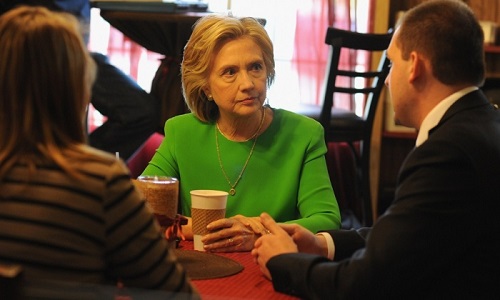
Campaign chair John Podesta tweeted:
Helping working families succeed, building small businesses, tackling climate change & clean energy. Top of the agenda.
Yet she herself has mentioned it only obliquely since announcing that she’s running. From the past we have this:
At the National Clean Energy Summit in September of last year, in her first major domestic policy address since stepping down from the state department, Clinton described global warming as “the most consequential, urgent, sweeping collection of challenges we face as a nation and a world”. Continue reading Climate clippings 136
Saturday salon 25/4 (Anzac Day)

An open thread where, at your leisure, you can discuss anything you like, well, within reason and the Comments Policy. Include here news and views, plus any notable personal experiences from the week and the weekend. Continue reading Saturday salon 25/4 (Anzac Day)
Climate clippings 135
1. Closing down dirty power
From Climate Code Red, a recent Oxford University report:
identified the most-polluting, least-efficient and oldest “sub-critical” coal-fired power stations. It found 89% of Australia’s coal power station fleet is sub-critical, “by far” the most carbon-intensive sub-critical fleet in world.
The International Energy Association, within a framework that itself is probably inadequate, says that one in four sub-critical power stations should close within five years. Hence 22% of our power stations should close within five years if we are to do our part. Continue reading Climate clippings 135
Climate clippings 134
1. Abbott’s energy white paper focuses on fossil fuel favourites
We should take a longer look at the Abbott government’s energy white paper, but from what Giles Parkinson says it would be a waste of time. As expected it ignores climate change and sees our future based on fossil fuels. Here’s Tones peering into our energy future:
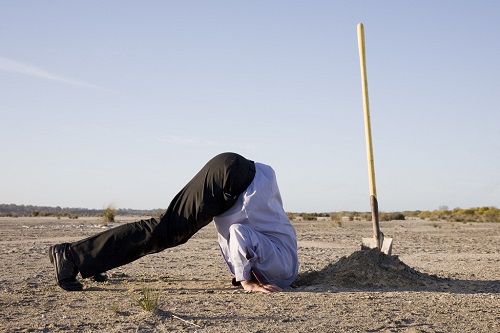
The world will pass him by!
2. Solar news
RenewEconomy was a flood of articles about solar.
A company based in the world’s largest oil exporting nation, Saudi Arabia, has become the new owner of Australia’s second-largest solar plant – the under-construction 72MW Moree PV project – after buying Spanish solar developer Fotowatio Renewable Ventures (FRV) and its 3.8GW global development pipeline.
Abdul Latif Jameel Energy and Environmental Services – a conglomerate that also has a base in the United Arab Emirates – announced its purchase of FRV on Wednesday, describing it as a major development of its energy business, and part of its on-going strategy to be the Gulf’s largest solar power plant developer.
Giles Parkinson says the prospects for big solar in WA are bright.
James Mandel and Leia Guccione take a look at a Rocky Mountain Institute report that analyzes how grid-connected solar-plus-battery systems will become cost competitive with traditional retail electric service and why it matters to financiers, regulators, utilities, and other electricity system stakeholders.
Paul McArdle reports on the benefits of tracking systems in solar PV from a seminar hosted by the UQ Energy Initiative and the Global Change Institute.
And more, as the Abbottistas fade into irrelevance, except that they are presently running (ruining?) the country.
3. Aluminium battery charges in one minute
US scientists say they have invented a cheap, long-lasting and flexible battery made of aluminium for use in smartphones that can be charged in as little as one minute.
The researchers, who detailed their discovery in the journal Nature, said the new aluminium-ion battery had the potential to replace lithium-ion batteries, used in millions of laptops and mobile phones.
Besides recharging much faster, the new aluminium battery is safer than existing lithium-ion batteries, which occasionally burst into flames, they added.
While lithium-ion batteries last about 1,000 cycles, the new aluminium battery was able to continue after more than 7,500 cycles without loss of capacity. It also can be bent or folded.
Larger aluminium batteries could also be used to store renewable energy on the electrical grid, Professor Dai said.
Meanwhile the US market for energy storage management systems, that is the software suites designed to increase the operating efficiency and overall value of energy storage, will grow tenfold between 2014 and 2019.
5. French banks rule out funding Galilee basin coal project
France’s three biggest banks have ruled out funding the controversial multi-billion dollar Galilee basin coal mining, rail and port development in Queensland. Eleven major international lenders have now publically stated that they won’t finance the $16.5 billion dollar project and one analyst says more delays could see the Indian company behind the project ultimately scrap the development.
6. Rising sea levels to force the largest exodus in history
Scientists calculate that within the next three decades a substantial area along the Bay of Bengal, a region of delta approximately 200 delta islands in India and Bangladesh called the Sundarbans, will be underwater due to climate change and rising sea levels. If that happens, the millions of people living there now will be forced to abandon their homes and lands, making their displacement the largest exodus in modern history.
Estimates predict that the region will be underwater within the next 10-25 years, forcing 8 million Bangladeshis and 5 million Indians inland.
That makes 13 million displaced. Other large movements cited include 10 million during the 1947 India-Pakistan partition and 7 million African Americans move from the southern states northward during the period 1916-1970. The one he missed was the movement of Germans from Eastern Europe towards the end and after World War II. Tony Judt reckons 13 million.
7. Contrarian climate scientists
Dana Nuccitelli reviews an interview with top contrarian climate scientists Roy Spencer and John Christy. You can read his analysis of their flawed thinking and erratic statements. I’d like to pull out three points.
First, John Cook et al’s survey that established the 97% consensus in the peer-reviewed literature on human-caused global warming does not categorise the 3% as complete denialists. The 3% includes papers by scientists, such as Spencer and Christy, who minimise human influence on global warming. Complete denialists amongst climate scientists are rare if they exist at all.
Second, the American Meteorological Society (AMS) and Yale University conducted a survey of meteorologists in relation to climate science and global warming. Only 13 percent of survey participants described climate as their field of expertise. I was surprised at how low the number is.
Third, on the cost of renewables:
Experts in these fields who have published research on the subject have found that fossil fuels are incredibly expensive, when we account for all of their costs. For example, one recent study conservatively estimated that including pollution costs, coal is about 4 times more expensive than wind and 3 times more expensive than solar energy in the USA today.
Saturday salon 11/4 (late edition)

An open thread where, at your leisure, you can discuss anything you like, well, within reason and the Comments Policy. Include here news and views, plus any notable personal experiences from the week and the weekend.
For climate topics please use the most recent Climate clippings.
The gentleman in the image is Voltaire, who for a time graced the court of Frederick II of Prussia, known as Frederick the Great. King Fred loved to talk about the universe and everything at the end of a day’s work. He also used the salons of Berlin to get feedback in the development of public policy.
Fred would only talk in French; he regarded German as barbaric. Here we’ll use English.
The thread will be a stoush-free zone. The Comments Policy says:
The aim [of this site] is to provide a venue for people to contribute and to engage in a civil and respectful manner.
Here are a few bits and pieces that came to my attention last week.
1. Richie Benaud passes on
The ABC puts it well:
Cricket icon Richie Benaud, who distinguished himself first as a leg-spinning all-rounder, then as a daring Australian Test captain and later as the ‘voice of cricket’ in the commentary box, has died at the age of 84.
Benaud’s skills, drive and determination took him to the top on and off the cricket field, and made him one of Australia’s most recognised people, instantly identifiable simply as Richie.
He played 63 Tests for Australia, was the first player to score 2,000 Test runs and take 200 Test wickets, and never lost a series as Australian captain.
After hanging up his Baggy Green cap, he spent more than four decades as the king of cricket commentators, a man viewed around the world as one of the best callers, watchers and analysts of the game – and perhaps its best ambassador as well.
While acknowledging his record I’d rate him as a top-flight bowler who was a handy batsman rather than a genuine all-rounder, who would be selected for his batting and his bowling absent the other. Genuine all-rounders are rare. I can think of Garfield Sobers, Keith Miller and Ian Botham, also Adam Gilchrist in a sense.
Benaud, I think, gave some respectability to the Packer circus and was apparently quite influential in giving advice.
2. Opinion polls
In Great Britain Ed Miliband overtakes David Cameron in approval ratings, as Labour pulls ahead in the polls.
Here in Oz Newspoll studied quarterly trends with a larger than usual sample. The headlines and much of the reporting was about Abbott’s poor performance in WA. You had to dig to find the national TPP poll which had Labor ahead 55-45. Also:
Opposition Leader Bill Shorten leads Mr Abbott 44-34 as preferred prime minister.
He is now ranked as better prime minister in all states for the first time.
Roy Morgan now has Labor ahead 53-47 and as does the Essential Report.
If this keeps up Labor could lose the election, because they’ll give Abbott the flick and put in Julie or Malcolm.
Australia’s imprisonment rate at 186 per 100,000 is historically high and getting higher. Moreover:
In contrast to most other developed countries, this rate is palpably high. The rate in Canada is 118 per 100,000. The incarceration rate in Australia is nearly three times higher than in Scandinavian countries.
Standing apart from these trends is the world’s greatest incarcerator, the United States, which imprisons more than 700 people per 100,000 – an increase of more than 400% in three decades.
It’s costing us a pile of money – we spend $A80,000 per prisoner per year compared to $A30,000 in the US. This wouldn’t be so bad if it worked, but it doesn’t:
Sentencing is the area of law where there remains the biggest gap between what science tells us can be achieved through a social institution (criminal punishment) and what we actually do.
In fact
our prisons [are] where the greatest number of human rights infractions occur.
The solution?
The start and endpoint to the solution is to confine jails (almost exclusively) to those we have reason to be scared of: sexual and violent offenders.
Thanks to John D for bringing this article to my attention.
4. Keep an eye on Greece – something unusual is happening
James Galbraith has been to Greece to consult on their problems and reported in an amazing speech to the European Trade Union Institute.
So as these manoeuvres, as I call them, mature, there emerges an interesting possibility. And that is the possibility of a politically stable, anti-austerity government in Europe, led, as I think you probably have observed, by forceful personalities, and presiding over an economy which is so far down that it has no place to go but up. And that may well be, within a short period of time, on a track of some recovery, some improvement in jobs performance and stabilisation of its external debt situation.
This would be in the wake of a crisis that was brought on by the neoliberal financial policies of the early part of the 2000s. Which was then aggravated and prolonged by the austerity ideology that succeeded the crisis, by the profoundly counterproductive policies with which Europe has reacted to the crisis. And so the possibility that an anti-austerity government might lead the beginning of a recovery from the austerity regime is, I think, a present reality and it is, of course, a nightmare in certain quarters.
Finance Minister Yanis Varoufakis and Prime Minister Alexis Tsipras have faced a wall of grief and pain from a hostile media and European finance authorities. If they prevail it will be because in the end Angela Merkel is pragmatic rather than doctrinaire. The stakes are high:
It goes beyond that to the future of Europe and beyond that, to the meaning of the word democracy in our time.
If you have a spare hour, Yanis Varoufakis talks with Joe Stiglitz. I haven’t yet had time for more than the first half hour.
Saturday salon 4/4

An open thread where, at your leisure, you can discuss anything you like, well, within reason and the Comments Policy. Include here news and views, plus any notable personal experiences from the week and the weekend.
For climate topics please use the most recent Climate clippings.
The gentleman in the image is Voltaire, who for a time graced the court of Frederick II of Prussia, known as Frederick the Great. King Fred loved to talk about the universe and everything at the end of a day’s work. He also used the salons of Berlin to get feedback in the development of public policy.
Fred would only talk in French; he regarded German as barbaric. Here we’ll use English.
The thread will be a stoush-free zone. The Comments Policy says:
The aim [of this site] is to provide a venue for people to contribute and to engage in a civil and respectful manner.
Here are a few bits and pieces that came to my attention last week.
1. Birthdays!
Three birthdays to mention.
Larvatus Prodeo was born at Easter 2005, so would be 10 years old if still alive. I started blogging there about three months later.
Secondly, I turned 75 just over a week ago.
I usually don’t make a fuss over birthdays, reasoning that I’m just one day older than the day before. So every day is new. My cardiologist is very happy with me, and I can tell you that since my triple bypass in 2000 he’s the main man!
Third, Climate Plus was born a year ago tomorrow. Some 318 posts later we are still here. It has been an experience – some surprises, some disappointments.
For the foreseeable future I plan to carry on. Political posts are more than twice as popular as climate posts, but our main reason for being here is climate. My aim is to keep the lay reader abreast of important developments in a brief and digestible form.
Feedback is more than welcome.
2. Vale Betty Churcher (1931-2015)
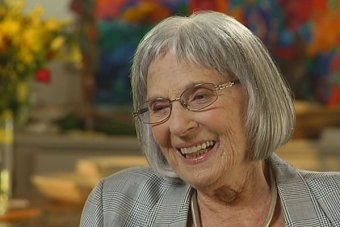
Betty Churcher died during the week, aged 1984. As an artist, as a teacher, as an arts administrator, and as a human being she excelled and attracted nothing but praise.
As a woman she had several firsts, most notably in 1990 she became the first woman at the helm of the National Gallery of Australia, where she was director for 7 years.
While there she earned the nickname “Betty Blockbuster” for presiding over 12 international blockbuster exhibitions, which in turn led to a corresponding growth in the gallery’s attendance numbers and revenue. She also initiated the construction of new galleries for large-scale temporary exhibitions, gave the gallery its current name after dropping “Australian National Gallery” and acquired Arthur Streeton’s Golden Summer, Eaglemont, 1889, for $3.5 million.
Image courtesy of the ABC.
3. Selling ugly produce at low prices
Every year Canadians waste some 40% of their food. A large part of the problem is that “ugly” food, misshapen or marked, is thrown out. Now one large retailer is selling this food at a discount in Ontario and Quebec.
Should happen here.
4. UK elections
The UK election campaign started in earnest. Here’s a prediction of the outcome.
According to that it could be a coalition of Labour, the Scottish National Party and what’s left of the Liberal Democrats.
Ed Miliband seems to have come through the leaders debate OK.
5. Jacqui Lambie starts her own party
Jacqui Lambie has applied to register The Jacqui Lambie Network as a political party.
She’s also got something else to think about.
A PUP statement released on Wednesday threatened to spend up to $3 million on legal fees in a bid to recover $2 million and $7 million from Senator Lambie and Senator Lazarus respectively.
Senator Glenn Lazarus quit the Palmer United Party earlier this year.
Senator Glenn Lazarus quit the Palmer United Party earlier this year.
PUP claims those are the amounts spent helping Senator Lazarus and Lambie get elected under the party’s banner at the 2013 election.
AdvertisementBoth senators have since abandoned PUP and are now sitting as independents.
Lambie says he promised not to sue.
6. Goodnight Goodluck Jonathon
President-elect of Nigeria Muhammadu Buhari told CNN’s Christiane Amanpour that he plans to aggressively fight corruption that has long plagued Nigeria and go after the root of the nation’s unrest.
For the first time in Nigeria’s history, the opposition defeated the ruling party in democratic elections.
Buhari defeated incumbent Goodluck Jonathan by about 2 million votes, according to Nigeria’s Independent National Electoral Commission.
The win comes after a long history of military rule, coups and botched attempts at democracy in Africa’s most populous nation.
Jonathon’s main contribution seemed to be making many billions of oil revenue due to the state magically disappear.
Climate clippings 132
1. Accelerating ice loss from Antarctica shelves
Some ice shelves in Antarctica are thickening and some are thinning. The pattern between east and west is obvious from this image:
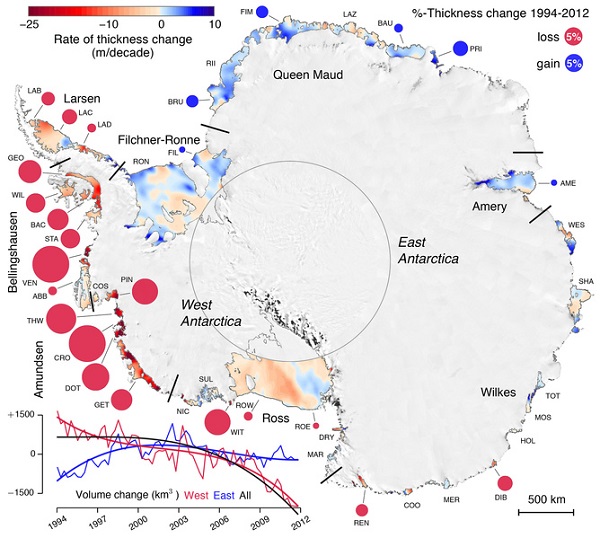
When we sum up losses around Antarctica, we find that the change in volume of all the ice shelves was almost zero in the first decade of our record (1994-2003) but, on average, over 300 cubic kilometers per year were lost between 2003 and 2012.
According to the ABC story, some shelves lost almost 20% of their thickness.
Melting ice shelves does not itself cause sea level rise, but the shelves buttress land ice, which then becomes more mobile. The graph in the bottom corner of the image shows that East Antarctica is now also experiencing a net loss of ice from ice shelves.
2. Top polluters to set own limits virtually penalty free
ANU economist Frank Jotzo said the system is designed so no-one gets caught by it – a toothless tiger. Tony Wood of the Grattan Institute said the ideas proposed in the paper simply would not work. They were commenting on a Government consultation paper outlining “safeguards” to ensure the big polluters do not offset emissions saved through the Emission Reduction Fund (ERF), a flagship component of Direct Action.
Australia’s 140 top polluters will set their own limits for future pollution virtually penalty free, according to the Government’s latest Direct Action policy paper.
Companies subject to the safeguards will select a baseline, or limit, for future pollution.
That baseline will be set according to the highest peak of emissions from the past five years.
Just plain stoopid!
3. What’s going on in the North Atlantic?
Stefan Rahmstorf asks the question at RealClimate. There is a large patch in the North Atlantic which has cooled in the last century.
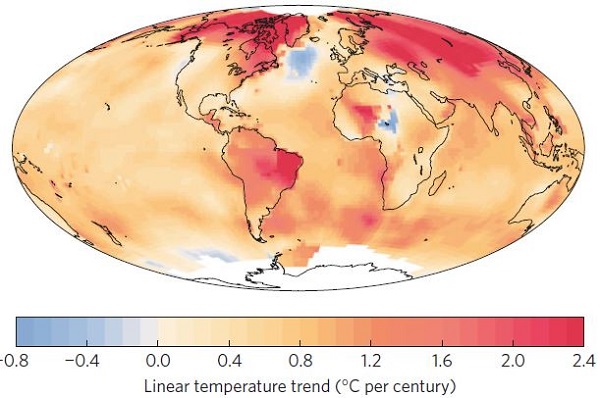
Rahmstorf explains:
Our recent study (Rahmstorf et al. 2015) attributes this to a weakening of the Gulf Stream System, which is apparently unique in the last thousand years.
In fact during last winter, which was the warmest on record for the planet overall, this patch had the coldest temperatures on record.
Chief suspect has to be the increasing freshwater coming off Greenland. There will be consequences.
The consequences of a large reduction in ocean overturning would look nothing like the Hollywood film The Day After Tomorrow. But they would not be harmless either – e.g. for sea level (Levermann et al. 2005) particularly along the US east coast (Yin et al. 2009), marine ecosystems, fisheries and possibly even storminess in Europe (Woollings et al. 2012).
A complete breakdown of the current was given up to a 10% chance this century in the IPCC report. This may have been an underestimate.
4. Rapid Arctic warming is changing the Jetstream and the weather
Another study, also involving Rahmstorf, looks at changing atmospheric circulation patterns due to Arctic warming.
The Arctic is warming faster than lower latitudes. The Jetstream velocity depends on temperature difference, hence it is slowing. It is also more wavy and has a tendency to get stuck, so heat or cold persists over a large area. Ironically, there is less storminess. Storms transport water onto land and break up persistent weather patterns.
The jet stream that circles Earth’s north pole travels west to east. But when the jet stream interacts with a Rossby wave, as shown here, the winds can wander far north and south.
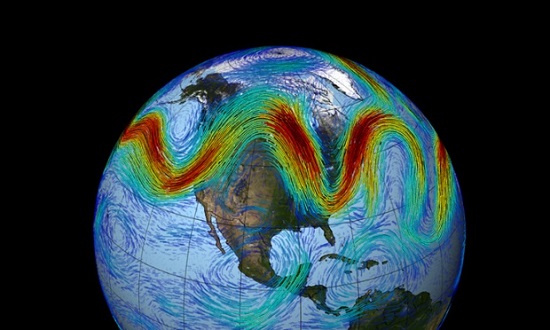
5. Brisbane EV charging technology takes on the world
Brisbane-based electric vehicle infrastructure company, Tritium, has done a deal to supply its award-winning Veefil DC fast charging stations to America’s ChargePoint company. ChargePoint has 21,000 EV chargers around the US.
The Australian-made stations will be installed on major routes across the country, including the express charging corridors on both the east and west coasts of the US that are being built as part of a recent deal between ChargePoint, Volkswagen and BMW.
The 50kW Veefil stations – which in the US will be called DC Fast stations and will be ChargePoint branded – are able to deliver up to 80 miles or 128 kilometers of charge in just 20 minutes, thus removing one of the key barriers to EV uptake: range anxiety.
Saturday salon 28/3

An open thread where, at your leisure, you can discuss anything you like, well, within reason and the Comments Policy. Include here news and views, plus any notable personal experiences from the week and the weekend.
For climate topics please use the most recent Climate clippings.
The gentleman in the image is Voltaire, who for a time graced the court of Frederick II of Prussia, known as Frederick the Great. King Fred loved to talk about the universe and everything at the end of a day’s work. He also used the salons of Berlin to get feedback in the development of public policy.
Fred would only talk in French; he regarded German as barbaric. Here we’ll use English.
The thread will be a stoush-free zone. The Comments Policy says:
The aim [of this site] is to provide a venue for people to contribute and to engage in a civil and respectful manner.
Here are a few bits and pieces that came to my attention last week.
1. Scientists at Large Hadron Collider hope to make contact with parallel universe

The LHC is being fired up again after two years down time when it was refurbished and enhanced. In their first experiment they hope:
a completely new universe will be revealed – rewriting not only the physics books but the philosophy books too. It is even possible that gravity from our own universe may ‘leak’ into this parallel universe, scientists at the LHC say.
As mentioned at Mark’s Facebook, if they want a parallel universe a plane ticket to Australia might be cheaper.
2. Crazy polls
Either opinion is swinging wildly or the pollsters have lost it.
Two weeks ago there was a significant crossover of Newspoll and Morgan. Now they’ve crossed back again.
Morgan has a 2.5% swing to to ALP, putting them on 56/44 TPP.
Newspoll has a 4% swing the other way to leave Labor barely ahead on 51-49.
Essential has a 2% swing to Labor this week to leave it comfortably ahead on 54-46. Essential’s weekly poll has been reasonably steady over a four-week period.
3. ‘Supertide’ at Mont Saint-Michel
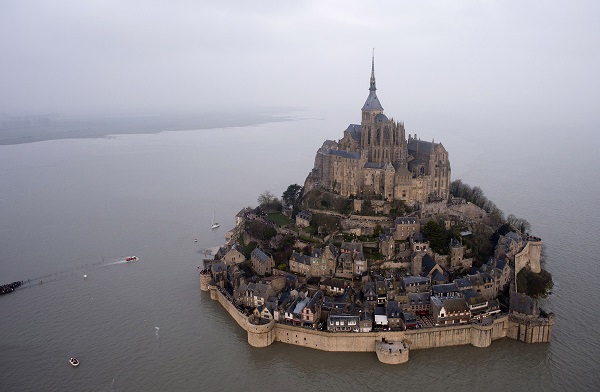
They call it the tide of the century, but it actually happens every 18 years. Mont Saint-Michel is a tidal island off the coast of Lower Normandy. Acessible by a causeway at low tide, the tide comes in at the speed of a galloping horse. Mont Saint-Michel receives over three million visitors each year.
4. Native title threatens Adani’s Carmichael mine
Adani’s Carmichael mine in the Galilee Basin is planned to mine 60,000 tonnes of coal per year, creating 10,000 direct and indirect jobs. Adrian Burragubba as spokesman for the Wangan and Jagalingou Family Council says that under native title they do not approve of mining in any shape or form and no amount of money will change their mind.
We’re concerned that it will devastate the land beyond repair.
It will destroy the waterways and our totemic animals and beings that are on that land and our ancestor dreaming stories and those things that are associated with our culture and heritage.
And it will also destroy it beyond repair to the point where we’ll be displaced forever from that land as the original custodians of that land.
It seems that the native title claim substantially overlaps with another native title claim lodged by the Bidjara people. If the claim cannot be settled between the groups then the Federal Court will test the matter at trial.


